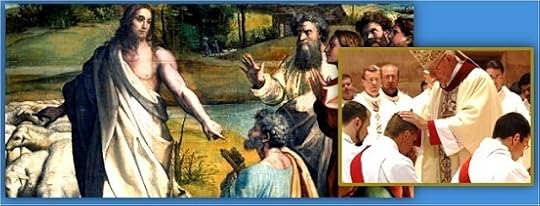Carl E. Olson's Blog, page 101
April 16, 2014
Serving the Church through a “Second Vocation”
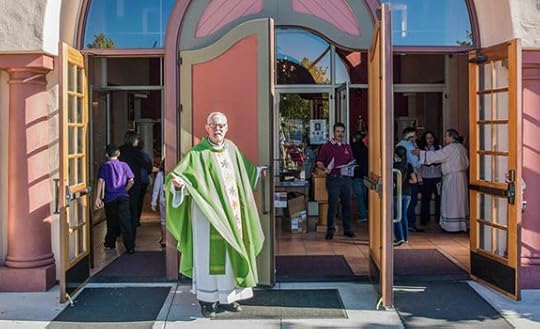
Father Jerry Brown, pastor of Immaculate Heart of Mary Church in the Diocese of Oakland, California
Serving the Church through a “Second Vocation” | Jim Graves | CWR
Ordained in their 40s, 50s, or 60s, these men offer a unique pastoral perspective to their flocks.
Many diocesan seminaries will not accept older applicants to the priesthood, and often with good reason. An older man can have greater difficulty in meeting the demands of the priesthood or giving up the freedom or material success of his single life, or find it a challenge to place himself under the authority of a bishop. When people age, they often become more set in their ways, and might struggle in adapting to the life of a diocesan priest.
While some American dioceses will not accept men over 40 to study for the priesthood, others are open to older vocations. The following are the stories of five men—four priests and one transitional deacon—who were ordained in their 40s, 50s, and 60s and who have found great success and many blessings in their “second vocation.” Each of their stories is unique, and each has contributed much to the life of the Church.
From Episcopalian pastor to Catholic priest
Father Jerry Brown (pictured above), pastor of Immaculate Heart of Mary Church in Brentwood in the Diocese of Oakland, California, was ordained to the priesthood in 2001, at age 54.
He was born in Napa, Northern California’s wine country, to two non-religious parents. He developed an interest in the Catholic Church through some friends, even considering the priesthood. His father persuaded him to instead become a priest in the Episcopal Church. He was ordained an Episcopal priest in 1970, and served for 25 years. He married, and had four children (two of whom are surviving; one died as a small child, the other as an adult in an auto accident).
In his years as an Episcopal priest, Father Brown saw the Episcopal Church change dramatically. “The church I left,” he said, “was a different one than the one I joined.” Socially, the Episcopal Church “embraced every liberal cause,” such as the ordination of women, acceptance of homosexual behavior, no-fault divorce, and abortion. Theologically, it “had abandoned the historic faith, and is now getting in to New Age stuff.”
“The seeds were planted at the Reformation,” he remarked, “Society was changing, and the church didn’t stand against it, but went along with it.” He saw his church empty, growing unable to support a priest with a family.
Why Jesus is God: A Response to Bart Ehrman
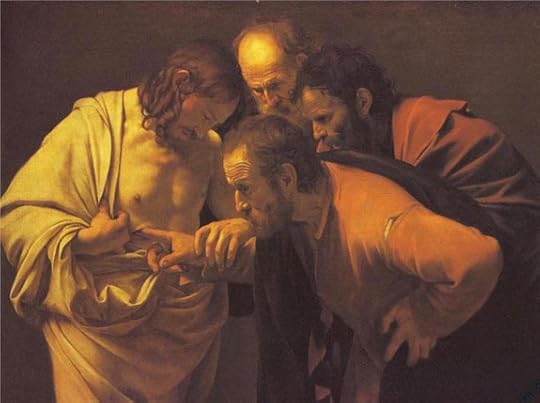
"The Incredulity of Saint Thomas" by Michelangelo Merisi da Caravaggio (c. 1602)
Why Jesus is God: A Response to Bart Ehrman | Very Rev. Robert Barron | CWR blog
An agnostic (and former Fundamentalist) breathlessly presents an old thesis as though he has made a brilliant discovery
Well, it’s Easter time, and that means that the mainstream media and publishing houses can be counted upon to issue de-bunking attacks on orthodox Christianity. The best-publicized of these is Bart Ehrman’s latest book How Jesus Became God. Many by now know at least the outlines of Ehrman’s biography: once a devout Bible-believing evangelical Christian, trained at Wheaton College, the alma mater of Billy Graham, he saw the light and became an agnostic scholar and is now on a mission to undermine the fundamental assumptions of Christianity.
In this most recent tome, Ehrman lays out what is actually a very old thesis, going back at least to the 18th century and repeated ad nauseam in skeptical circles ever since, namely, that Jesus was a simple itinerant preacher who never claimed to be divine and whose “resurrection” was in fact an invention of his disciples who experienced hallucinations of their master after his death. Of course Ehrman, like so many of his skeptical colleagues across the centuries, breathlessly presents this thesis as though he has made a brilliant discovery. But basically, it’s the same old story. When I was a teenager, I read British Biblical scholar Hugh Schonfield’s Passover Plot, which lays out the same narrative, and just a few months ago, I read Reza Aslan’s Zealot, which pursues a very similar line, and I’m sure next Christmas or Easter I will read still another iteration of the theory.
And so, once more into the breach. Ehrman’s major argument for the thesis that Jesus did not consider himself divine is that explicit statements of Jesus’ divine identity can be found only in the later fourth Gospel of John, whereas the three Synoptic Gospels, earlier and thus presumably more historically reliable, do not feature such statements from Jesus himself or the Gospel writers. This is so much nonsense.
April 14, 2014
An Anxious Age—and an Antagonistic Future?
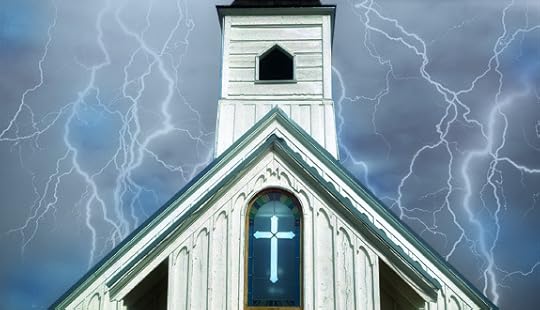
An Anxious Age—and an Antagonistic Future? | Christopher White | CWR
Jody Bottum's new book examines why the old language of traditional religion is out, and a new language of spirituality is in
In 1965, over fifty percent of Americans were active members of mainline Protestant churches. Today that number is down to under ten percent. Meanwhile, Catholicism in America continues to enjoy moderate success, primarily due to the wave of new immigrants, but weekly mass attendance is in significant decline. Yet ask the average passerby on the streets about their religious beliefs and few are willing to dismiss religion all together. From the increased practiced of yoga, to the deeply moralistic rationale of Wall Street’s occupiers in 2011, to Tea Party members who invoke the Almighty as often as they do patriotic duty, there is no shortage of spiritual language filling our public discourse today—it’s just that American religion as we have known it is seemingly passé.
The old language of traditional religion is out. A new language of spirituality is in.
“Ours is an anxious age—the Anxious Age, it often seems,” writes Joseph Bottum in his new book by that very title. “A moment more tinged by its spiritual worries than any time in America since perhaps the 1730s,” he speculates. Borrowing from the great sociologist Max Weber, Bottum laments the disenchantment of the world, and in particular, the fact that Christianity has been stripped bare of its mystery and supernatural elements, with social and political ideas now elevated to the divine and with science considered salvific.
Bottum’s project in An Anxious Age: The Post-Protestant Ethic and the Spirit of America is twofold: first, to trace the decline of mainline Protestantism in America, which has been central to our public institutions and vocabulary. “When the Mainline died,” he writes, “it took with it to the grave the vocabulary in which both criticism and support of the nation could be effective.”
April 13, 2014
Palm Sunday and the Holy Eucharist
A Scriptural Reflection on the Readings for Sunday, April 13, 2014, Palm Sunday of the Lord’s Passion
Readings:
• Mt. 21:1-11
• Is 50:4-7
• Ps 22:8-9, 17-18, 19-20, 23-24
• Phil 2:6-11
• Mt 26:14-27:66
“For the infant Church, ‘Palm Sunday’ was not a thing of the past,” wrote Pope Benedict XVI in Jesus of Nazareth: Holy Week (Ignatius, 2011). “Just as the Lord entered the Holy City that day on a donkey, so too the Church saw him coming again and again in the humble form of bread and wine.”
Today’s readings focus our attention on the connection between Jesus’ humble entrance into Jerusalem on a lowly donkey and his loving gift of the Eucharist, which he instituted prior to his Passion and death. “At the Last Supper, on the night when He was betrayed, our Savior instituted the eucharistic sacrifice of His Body and Blood”, states the Vatican II Constitution on the Sacred Liturgy, “He did this in order to perpetuate the sacrifice of the Cross throughout the centuries until He should come again, and so to entrust to His beloved spouse, the Church, a memorial of His death and resurrection: a sacrament of love, a sign of unity, a bond of charity, a paschal banquet in which Christ is eaten, the mind is filled with grace, and a pledge of future glory is given to us” (par. 47).
Taken together, today’s readings present us with two essential, yet mysterious, movements or patterns: one vertical and the other horizontal, each centered on Jesus Christ.
The vertical movement is between heaven and earth, from divinity to humanity—and back. “Christ Jesus, though he was in the form of God, did not regard equality with God something to be grasped” wrote St. Paul in the great Christological hymn in his letter to the Philippians. The Son of God came in the “form of a slave” and humbled himself, accepting the cruelty of death on the cross. This, of course, was a most astounding, unexpected descent, flowing from the love the Father and the obedience of the Son.
In the eyes of the world, the cross was complete and utter defeat. But, as Benedict noted, “The hour of the Cross is the hour of the Father’s true glory, the hour of Jesus’ true glory.” Because of his loving obedience, Paul explained, Jesus was greatly exalted and given the name that “is above every name”. And to what end? For the confession of every tongue that Jesus is Lord and for the glory of the Father. The descent of the eternal Word into the world results in the ascent of the Incarnate Word into the heavenly realms, opening the doors of life for all those united to him in faith.
The horizontal movement is from the Old Covenant and the Old Israel to the New Covenant and the New Israel. Prior to his entrance into the holy city on a donkey, Jesus had kept silent about the fact that he was the Christ (cf. Matt. 16:20). But his entrance purposefully revealed that he was the Davidic king and Messiah promised by the prophet Zechariah: “Rejoice heartily, O daughter Zion, shout for joy, O daughter Jerusalem! See, your king shall come to you; a just savior is he, Meek, and riding on an ass, on a colt, the foal of an ass” (Zech 9:9).
The pilgrims who accompanied Jesus cried out, “Hosanna” (that is, “Save us!”), sang the praises of the Son of David, and told the unsettled city dwellers: “This is Jesus the prophet, from Nazareth in Galilee.” But, just as Jerusalem had been greatly troubled by the news of Jesus’ birth (Matt 2:2-3), the city was upset by this display of joyful praise; the stage was set for the arrest and crucifixion of Christ, where the vertical and horizontal movements would meet—on the Cross.
The King of kings comes to the New Israel—the Church—in the sacraments of the New Covenant. In the sacrament of the Eucharist he comes in the humble form of bread and wine, hidden from the world but visible to those who say in faith, “This is Jesus. Hosanna! Save us!”
(This "Opening the Word" column originally appeared in the April 17, 2011, edition of Our Sunday Visitor newspaper.)
April 11, 2014
Why Waugh?
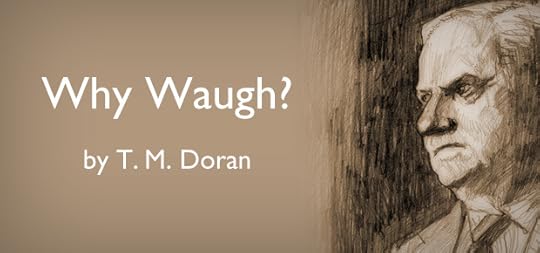
by T. M. Doran | IPNovels.com
If you made a list of writers who are masters at storytelling, masters of humor, and masters of English prose, it would be a short list. One who belongs on this list is Evelyn Waugh.
British novelist and journalist, Evelyn Waugh, had three books listed among the Modern Library’s 100 Best Novels of the 20th century, but he doesn’t seem to be read by many today, even those in literary circles. Nonetheless, he is a masterful writer, able to evoke a broad spectrum of ideas and feelings with subtlety, poignancy, and humor.
I’m not an Evelyn Waugh scholar, expert, biographer, or anything of the sort, but I have read many of his novels, including those considered to be his best efforts: Brideshead Revisited, Scoop, Vile Bodies, and Handful of Dust, for both enjoyment and instruction in the art of writing, if such genius can be imparted.
One of the reasons for Waugh’s relative obscurity today, apart from the British society and events of his books belonging to another era, is his implicit rejection of nihilism, the lodestar for most “serious” authors since the 1960s.
April 10, 2014
A Priest by Any Other Name
A Priest by Any Other Name | Fr. Donald J. Planty, Jr., J.C.D. | Homiletic & Pastoral Review
The nature of Holy Orders is both collegial and personal. Collegially, all priests are addressed as “Father” because all share in the one priesthood of Jesus, icon of the Father. Personally, each priest retains his own individuality, his own personality–his own name and identity…
Recently a friend of mine who was a transitional deacon, soon to be ordained a priest–a completely faithful, orthodox man–confessed to me that, as a priest, he would prefer to be called by his Christian name, “Father Thomas,” rather than by his last name. I encouraged him, recalling that I have always considered it a pity that, in the United States, the usage is for diocesan priests to be addressed by their last names. From my ordination I chose to go by “Father Planty” both to be faithful to the tradition (which is, in fact, a national custom) and as a reaction to what I called the “Father Joe Cool priests” and their lay allies: “liberal” Catholics (not consistently faithful to the Church’s teachings and disciplines) who preferred to use “Father Joe” (or who would jettison the title of “Father” altogether and simply call the priest by his first name) as a way of blurring the necessary distinction between clergy and laity and so forcing a disordered equality and an inordinate familiarity. My friend the deacon’s wish has led me to suggest we reconsider the question of the name by which priests are addressed in light of the theology of names, in light of Church custom, and in light of the signs of the times and the New Evangelization.
I can only summarize here the rich–indeed, foundational–theology regarding the unity of name and identity found in Sacred Scripture and in Sacred Tradition. From the naming of Adam in Genesis through the new name given the victors in the book of Revelation, the inspired word of God makes clear that one’s name is one’s identity, and that a change in name (Abram to Abraham, Jacob to Israel, Simon to Peter, etc.) signifies a change in identity, in mission.
A Time of Mercy
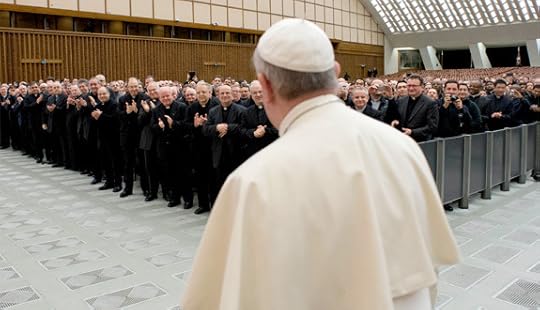
Pope Francis looks on as priests applaud him during a meeting in Paul VI audience hall at the Vatican March 6, 2014. The pope's annual Lenten meeting with Rome pastors focused on the priest's call to be a minister of mercy. (CNS photo/L'Osservatore Romano)
A Time of Mercy | Fr. James V. Schall, SJ | CWR
Heaven cannot be populated by human beings who refuse to be there, whose lives indicate they do not want to be there
“I am sure of this. It is not only Lent; we have been living in a time of mercy for the past thirty years or more, up to today.” — Pope Francis, Exhortation on Mercy to Roman Priests, March 6, 2014
I.
Every year, during Lent, the current pope meets with the priests of the city of Rome, quite a large gathering. This year the meeting was held in the Paul VI Audience Hall, a very large auditorium. The Pope mentions the faithful to whom pastors must extend “great, great mercy.” This is a charming exhortation. He tells us that Jesus was always “on the road,” once he began his public life. (I am reminded of the famous Willie Nelson song, “On the Road Again.”) The Pope tells us that “Jesus’ life was on the road.” We see Christ’s concern for the crowds and their needs. The Pope insists that priests should get out of the rectory. They should know what goes on in their neighborhood. Once they do, “the horizon broadens, and we see that these towns and villages are not only Rome and Italy; they are the world and those helpless crowds are the peoples of many nations who are suffering through even more difficult situations.” No one ever accused Pope Francis of a narrow vision!
Pope Francis is sober. “We are not here to take part in a pleasant retreat…but rather to hear the voice of the Spirit speaking to the whole Church of our time.” Any place, even Rome, is every place. The Spirit speaks to “the whole Church of our time, which is a time of mercy.” It is interesting that the word “justice” never appears in this exhortation of Francis to the Roman clergy. The Pope adds that we have been living in this “time of mercy” for thirty years, from the time of John Paul II.
Logically, a time of mercy or of grace would mean that era should be otherwise. We are living on borrowed time. Here, Francis recalls the canonization of Sister Faustina Kowalska and the Divine Mercy Sunday that John Paul II began. At that time, John Paul II clarified a most significant doctrine. God, John Paul observed, would forgive everything that could be forgiven. Some things even God could not forgive. What are these? On those men who refused to be forgiven—who reject mercy—God cannot impose His will. He does not wish to undermine genuine free will. To do so, would undermine the whole redemptive order, the whole worth of His free relation to man. Heaven cannot be populated by human beings who refuse to be there, whose lives indicate they do not want to be there.
We have short memories, as Pope Francis tells us. Yet, “we cannot forget the great intuitions and gifts that have been left to the People of God. And Divine Mercy is one of these.”
April 9, 2014
Welcome to The Reign of “Gay”
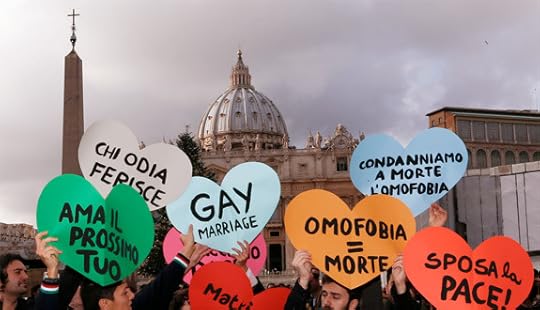
Members of a gay activist group hold up signs outside St. Peter's Square at the Vatican in this December 2012 photo. (CNS photo/Alessandro Bianchi, Reuters)
Welcome to The Reign of “Gay” | Carl E. Olson | Editorial | Catholic World Report
Make no mistake, it has nothing to do with fun and games, and everything to do with the forced rationalization of grave depravity
In the summer of 1992, I took my first real job, working as a graphic designer for the venerable Meier & Frank department store chain in downtown Portland, Oregon. Those three years proved to be quite educational for a fairly naïve young man fresh out of Bible college and figuring out the ways of the world in the very beautiful, exceedingly secular Northwest. Within just a few days, I found myself having long conversations—arguments, actually—about Proposition 9, a measure sponsored by the Oregon Citizen's Alliance (OCA) which sought to add the following to the state constitution:
All governments in Oregon may not use their monies or properties to promote, encourage or facilitate homosexuality, pedophilia, sadism or masochism. All levels of government, including public education systems, must assist in setting a standard for Oregon's youth which recognizes that these behaviors are abnormal, wrong, unnatural and perverse and they are to be discouraged and avoided.
My most intense interlocutor was Bob, the copy chief in advertising department, who was openly homosexual. He insisted that supporters of Prop 9 were “homophobic” and therefore filled with hatred toward anyone who was “gay”. My response, in short, was to insist that I could both be his friend and disagree with him about homosexuality (and Prop 9). This led to a year-long debate that opened my eyes to how disingenuous, irrational, and spiteful are certain supporters of homosexual “rights”. I emphasize “certain” because I worked closely with other homosexuals (they, of course, preferred the term “gay”) who seemed content to leave well enough alone, with no interest in converting or coercing those with different beliefs.
And Bob did, in fact, seek to convert me, to the point that when I announced my engagement, he made a final, desperate play: he declared that I was actually “gay” and was not being “truthful” with myself. In hindsight, his gambit should not have surprised me; at the time, however, I was so startled that I laughed out loud. At that, he angrily told me that I was “dead to him” and stormed away. A few months later, he took a job in another state.
I thought of those events while recently reading about the resignation of Brendan Eich, CEO of Mozilla Corporation (maker of the popular Firefox browser). It turns out that Eich had given $1000 in support of Proposition 8, the 2008 California ballot proposition and state constitutional amendment that consisted of a simple statement: “Only marriage between a man and a woman is valid or recognized in California.” Prop 8 is, of course, widely described as a “anti-gay marriage” law, and Eich committed the unpardonable sin of refusing to confess his bigotry and bow low before the Altar of Homosexuality. The company released a statement, which included dutiful nods toward “equality and freedom of speech”, while lamenting that “[f]iguring out how to stand for both at the same time can be hard.” The company's “organizational culture”—that sounds friendly, doesn't it?—“reflects diversity and inclusiveness. … Mozilla supports equality for all.” The organizational culture doth protest too much, methinks.
The well-known blogger, Andrew Sullivan, who is “openly gay and a practicing Roman Catholic”, was apparently shocked by the banishment of Eich. Clearly angered by the entire affair, Sullivan wrote, “It turns out that Eich might have saved his job had he recanted, like all heretics must. But given the choice of recanting, he failed. Hence the lighting of the fires...” Sullivan further stated:
There is only one permissible opinion at Mozilla, and all dissidents must be purged! Yep, that’s left-liberal tolerance in a nut-shell. No, he wasn’t a victim of government censorship or intimidation. He was a victim of the free market in which people can choose to express their opinions by boycotts, free speech and the like. He still has his full First Amendment rights. But what we’re talking about is the obvious and ugly intolerance of parts of the gay movement, who have reacted to years of being subjected to social obloquy by returning the favor.
My simple question is this: Why is Sullivan surprised? Why is anyone surprised?
April 7, 2014
The Introduction to "Making Gay Okay" by Robert R. Reilly
Introduction to Making Gay Okay: How Rationalizing Homosexual Behavior Is Changing Everything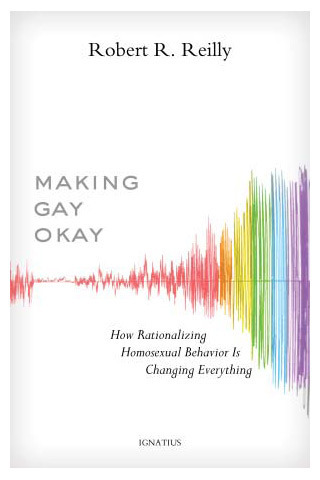 (Ignatius Press, 2014) by Robert R. Reilly
(Ignatius Press, 2014) by Robert R. Reilly
Many people are puzzled as to why anyone would or should get exercised over the issue of homosexual “marriage” because, when seen in isolation, it may appear to be a small matter that affects only a very tiny proportion of the population. If homosexuals constitute some 2 percent, an even smaller percentage of them will avail themselves of marriage, if it is allowed. That is certainly the evidence from countries, such as Canada and Sweden, where it has already been permitted for some years. So why all the fuss?
The concern can be understood only when the issue is seen within the broader perspective of the false reality of which it is a part and, in many ways, the completion. The foundation stone of this false reality, as we shall see particularly in terms of Supreme Court decisions, was contraception, and the capstone is same-sex marriage. The progression from the one to the other was logically inescapable.
In my last year in college many years ago, I was discussing with a classmate the status of objective morality. He was strongly inclined toward moral relativism, and soon we got down to the bedrock principle of noncontradiction (i.e., that a thing cannot both be and not be in the same way, at the same time, in the same place). To my amazement, my classmate was willing to dispute this, stating that we do not know if this is true and speculating that at some point it might be shown not to be so. The conversation had to end there because there was no longer any basis upon which it could proceed.
At the time, I did not know that he was a homosexual. Later, while still a young man, he died of AIDS. Put bluntly, he denied the principle of noncontradiction, and the principle of noncontradiction denied him. Ideas have consequences, and so do actions based upon them. This is what is going to happen to us as a society if we put the capstone of same-sex marriage into place. We will be living a lie.
My thesis is very simple. There are two fundamental views of reality. One is that things have a Nature that is teleologically ordered to ends that inhere in their essence and make them what they are. In other words, things have inbuilt purposes. The other is that things do not have a Nature with ends: things are nothing in themselves, but are only what we make them to be according to our wills and desires. Therefore, we can make everything, including ourselves, anything that we wish and that we have the power to do. The first view leads to the primacy of reason in human affairs; the second leads to the primacy of the will. The first does not allow for sodomitical marriage, while the second does. Indeed, the problem is that the second allows for anything. This is what the same-sex marriage debate is really about—the Nature of reality itself. Since the meaning of our lives is dependent upon the Nature of reality, it too hangs in the balance.
This book is also about how to live rightly in respect to our sexual Nature. This issue is addressed within the opposing perspectives of a teleological and nonteleological human Nature. In Plato’s Gorgias, Callicles said to Socrates: “He who would live rightly should let his desires be as strong as possible and not chasten them, and should be able to minister to them when they are at their height by reason of his manliness and intelligence, and satisfy each appetite in turn with what it desires.” As he so often did, Socrates responded with a question: “And the culmination of the case, as stated—the life of catamites—is not that awful, shameful, and wretched? Or will you dare to assert that these are happy if they can freely indulge their wants?” (491e–492a). Is right the rule of the stronger, as Callicles asserted, and can one therefore freely indulge one’s desires? Or, as Socrates suggested, is there something in the constitution of human Nature that makes the sexual use of boys shameful because it is wrong? We will address these questions.
The plan of this book is first to present the nature of the culture war of which the struggle over same-sex “marriage” is a major part, to examine how rationalization operates as its animating force, and then to lay out the issues in a philosophical way, including the meaning of Nature as it was first used in Greek philosophy. Next, I will explicate the opposition to that understanding of Nature, utilizing the thought of Jean-Jacques Rousseau as its exemplar. The second part of the book will show how the homosexual rationalization and the thinking upon which it is based have marched through and devastated the institutions of American society and government—especially the judiciary, science and psychiatry, education, the Boy Scouts, the military, and US diplomacy. It is one thing to grasp the issues in the abstract and another to see how they work their way out in the practical details of daily life. Much of the natural-law argument against same-sex marriage will be given in responses to the arguments made in its favor in each of these settings, especially in the courtroom. I make no case from religion or revelation in this book, only from reason as it discloses to us the Nature of things.
It should be emphasized that this critique of the homosexual cause is not an attack upon homosexuals, nor is it generated by any animus against them. Over the course of several decades, my professional work in the arts has brought me into association with many homosexuals. I have been at pains to promote the work of those whose art I thought was stellar, without regard to this issue. In fact, in my many interviews and discussions with artists and composers whom I happened to know were homosexual, I have never had the subject of homosexuality arise in connection with their work or, in fact, in any other way. It was irrelevant. When someone once raised the subject when I was with a young homosexual artist who had already reached star status, the artist quickly dismissed the subject and simply responded, “It doesn’t define me.” This book is not about them and is not meant to offend them. It is about those who insist not only on defining themselves in this way, but on defining the rest of us as well.
My apologia would, of course, be hard to believe for anyone who has collapsed the distinction between the nature of an act and the person performing the act. It is this vital distinction that allows one to judge the act, not the person. It is also this distinction that removes any moral onus from a person whose homosexuality or, say, alcoholism is no fault of his own. But even a genetic predisposition, if such exists, to homosexuality or alcoholism does not deprive a person of his free will, so the person is still morally responsible for his homosexual acts or drunkenness. (Of course, if one has no free will—which is suggested by those who declare sexual restraint or abstinence to be impossible—then any notion of morality becomes absurd.) Only an omniscient God can finally judge the true condition of a man’s soul, but this in no way means that we cannot come to an understanding of the moral nature of an act, that we cannot know that some acts are great evils. I am sure this statement will not allay the inevitable charges of homophobia, but it is meant sincerely.
Note on usage. The word Nature is capitalized when referring to the metaphysical concept and lowercased when it is used synonymously with “character”. In different legal and cultural settings, the word sodomy has included different things at different times. But, in every variation, it has always encompassed anal intercourse and is meant to here as well. Among other things, gender means “the state of being male or female”, according to the Oxford Dictionary. I do not surrender the word to those who use it to mean that the masculine and the feminine are artificial constructs socially or politically engineered for men and women. Therefore, someone of the feminine gender is a woman—not someone who thinks he is a woman. The word good is capitalized when it refers to the divine, as in its use by Plato.
More about the book:
Making Gay Okay: How Rationalizing Homosexual Behavior Is Changing Everything

by Robert Reilly
Why are Americans being forced to consider homosexual acts as morally acceptable? Why has the US Supreme Court accepted the validity of same-sex "marriage", which, until a decade ago, was unheard of in the history of Western or any other civilization? Where has the "gay rights" movement come from, and how has it so easily conquered America?
The answers are in the dynamics of the rationalization of sexual misbehavior. The power of rationalization-the means by which one mentally transforms wrong into right-drives the gay rights movement, gives it its revolutionary character, and makes its advocates indefatigable. The homosexual cause moved naturally from a plea for tolerance to cultural conquest because the security of its rationalization requires universal acceptance. In other words, we all must say that the bad is good.
At stake in the rationalization of homosexual behavior is the notion that human beings are ordered to a purpose that is given by their Nature. The understanding that things have an in-built purpose is being replaced by the idea that everything is subject to man's will and power, which is considered to be without limits. This is what the debate over homosexuality is really about-the Nature of reality itself.
The outcome of this dispute will have consequences that reach far beyond the issue at hand. Already America's major institutions have been transformed-its courts, its schools, its military, its civic institutions, and even its diplomacy. The further institutionalization of homosexuality will mean the triumph of force over reason, thus undermining the very foundations of the American Republic.
Robert Reilly was Senior Advisor for Information Strategy (2002-2006) for the US Secretary of Defense, after which he taught at National Defense University. He was the director of the Voice of America (2001-2002) and served in the White House as a Special Assistant to the President (1983-1985). A graduate of Georgetown University and the Claremont Graduate University, he writes widely on "war of ideas" issues, foreign policy, and classical music. His previous book isThe Closing of the Muslim Mind: How Intellectual Suicide Created the Modern Islamist Crisis.
Praise for Making Gay Okay:
"If you read only one book on homosexuality, natural law theory, and the radical changes now being instituted within our culture, let it be this one!
Reilly exposes the unscientific reasons why homosexuality was normalized in the [American Psychiatric Association] diagnostic manual. He offers us some intriguing new material. In a clear, systematic, and engaging style, Reilly show us the inherent futility of same-sex acts, and eloquently explains what marriage really is. This book should be required reading for anyone who writes our laws-in fact, for anyone with cultural decision-making power. We must not allow the surging political tides to obscure what you and I ‘can't not know' about the nature and purpose of sexuality."
- Joseph Nicolosi, PhD, Co-Founder, National Association for Research and Therapy of Homosexuality (NARTH)
"Reilly has drawn on his extensive knowledge of classical political philosophy to explain the full scope of the dangers inherent in the modern homosexual rights movement. The movement threatens our very understanding of human nature, and hence of the American political regime that derives its understanding of rights and legitimate government from that nature. This book is a stark warning that should be read by every lover of liberty, and a call to action for those who would preserve it."
- John C. Eastman, JD, PhD Chairman, National Organization for Marriage Founding Director, Claremont Institute Center for Constitutional Jurisprudence
"This book is magnificent, a real achievement. For anyone interested in taking our country back from the sexual radicals, you must know how they did it, so rapidly, efficiently, even brutally. The gay rights movement slid through American institutions, both public and private, like a hot knife through butter. I suspect it has surprised even its proponents to see how fast we have capitulated. First philosophy fell, then psychology, the courts, education, the military and even the Boy Scouts followed. No one has told both the broad sweep and the specific details of this story better than Robert Reilly."
- Austin Ruse, President, Catholic Family and Human Rights Institute
"In our society, homosexuality has become more than a ‘sexual orientation'. It has now grown into a far-reaching movement seeking to redefine not only morality, but ideas about biology, human nature, law, and politics-indeed, to declare opposing views as beyond the pale of civilization. Robert Reilly has the multiple talents necessary to address the full range of relevant issues, from the philosophical to the practical. A rare tour de force on a defining question of our time."
- Robert Royal, PhD President, Faith & Reason Institute
"Robert Reilly shows that to go with the flow of the homosexual movement is to go against nature, science, children, marriage, the family and the common good; in fact to go against common sense. This movement is now the leader of a long-term pack working to undermine society, a process designed to bring chaos (see Gramschi) and dictatorship before freedom is enjoyed again. The time and the means to oppose are both narrowing. If this book does not move you to action nothing will."
- Patrick F. Fagan, Ph.D., Senior Fellow, Family Research Council
"The important contribution of Reilly´s book is explaining the background of the philosophic premises of the relevant Supreme Court cases. What drives those cases is not law, but ideology. This book effectively exposes that ideology."
- John S. Baker, JD, PhD Professor Emeritus, Louisiana State University Law School
"Plato teaches that societies take on the features and tastes of the persons most prominent in them. Reilly shows how America's ruling class is shaping our society according to its taste for homosexuality and its distaste for natural families. If you want to know the philosophical and legal background of the revolution that is being imposed upon America-and its consequences-read this book."
- Angelo M. Codevilla , PhD Professor Emeritus, Boston University; Author, The Character of Nations
"The mainstreaming of sodomistic practice is a sign that a culture has lost not only its faith but also its mind. Robert Reilly patiently and convincingly explains how that flight from reason occurred and what can be done about it."
- Charles E. Rice, JD, JSD Professor Emeritus of Law, University of Notre Dame Law School
"Robert Reilly is to be admired for tackling such an explosive topic with reason, balance, aplomb, and moral clarity. He shows how the rationalization of homosexual behavior has worked its way into the nooks and crannies of our public life-from parenting to foreign policy-and will be our culture's undoing if the current trend is not reversed. I hope that the compelling arguments in this book can play a key role in that reversal."
- Jay W. Richards, PhD Author, New York Times bestselling books Indivisible and Infiltrated
"Robert Reilly is a true Renaissance man, an expert in music, Islam, and cinema. In this work he explains how the acceptance of the rationalization for homosexual behavior may bring down our culture and society unless it is exposed, understood, and opposed.
- Fr. C. John McCloskey, Co-Author, Good News, Bad News
"A stiff brush against the fur of today's judicial and journalistic 'wisdom'. Read -- and argue."
- Michael Novak, American Enterprise Institute
Christ in an Age of Technique

Christ in an Age of Technique | James Kalb | Catholic World Report
The emphasis on speaking to modern man using modern language has meant far less emphasis on speaking Catholic language to Catholics
It seems that Catholics have been getting nowhere in the public square lately. The problem is not just losing ground on this issue or that, but an increasing inability to get our issues recognized as real and legitimate. That’s true not only with moral issues, but also with more basic ones like the rationality of religion and the very existence of human nature.
That situation seems to be new. Paul found that Christ crucified was foolishness to the Greeks and a stumbling block to the Jews, but he could quote Greek poets to the one and the Bible to the other, and with both he could appeal to the evidence of their hearts and the heavens. So he could start the discussion with a stock of common authorities and understandings.
Those are harder to find now. To make matters worse, Catholics share much of the incomprehension of their secular brothers. It’s not just nominal Catholics who often seem at a loss regarding the Church’s teachings and why they’re believable, but active laymen, educators, theologians, priests, and even bishops.
A basic part of the problem is the outlook that determines what is thought to make sense in public discussion today. Free speech doesn’t mean the best argument wins. If you say something that’s basically at odds with the attitudes and beliefs that animate a discussion you won’t be understood no matter what the merits. It will be as though you were speaking Etruscan, or trying to persuade a group of hunter-gatherers that they should go on a march to protest fat-shaming.
The problem grows with the size and diversity of the public. If the participants in a conversation are very numerous and different they aren’t likely to have much in common, and they won’t be able simply to say what’s on their mind and be confident of getting anywhere. Each will have to limit himself, and appeal to the few beliefs and concerns others can be counted on to share.
We learn what those are by looking at how public discussion is actually carried on.
Carl E. Olson's Blog
- Carl E. Olson's profile
- 20 followers


